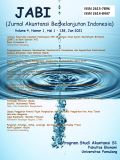Pencatatan Transaksi Pajak Pertambahan Nilai Kegiatan Membangun Sendiri
DOI:
https://doi.org/10.32493/JABI.v5i2.y2022.p211-227Keywords:
building, construction in progress, journal, tax accounting, VAT liabilitiesAbstract
Self-building activities (SBA) are objects of value-added tax (VAT) that have special provisions which are different from the object of VAT with general provisions. The method of recording SBA transactions should also be different from recording VAT transactions with general provisions. Errors in recording these transactions can result in errors in fulfilling tax obligations which will result in tax sanctions. This study aims to determine the extent to which the financial accounting and tax accounting literature discusses the recording of SBA and examines its compliance with applicable regulations. The study was conducted by reviewing 15 tax accounting kinds of literature and 10 financial accounting kinds of literature circulating in Indonesia. Based on the results of the study, there are three kinds of literature that include the recording of SBA. However, the explanation in the literature still allows for misinterpretation which can lead to tax sanctions. This study concludes that SBA transactions will be more appropriate if they are recorded in the SBA VAT Payable account rather than the Output VAT/VAT Payable account. This method will provide accurate and clear information about the existence of SBA VAT obligations and the payment period so that the entity can make appropriate decisions.
References
Agoes, S., Trisnawati, E. (2017). Akuntansi Perpajakan. Jakarta: Penerbit Salemba Empat.
Edy, D. S. (2017). Akuntansi Perpajakan. Jakarta: Modul tidak diterbitkan.
Gunadi. (2009). Akuntansi Pajak. Jakarta: Grasindo.
Ghozali, I., Chariri, A. 2014. Teori Akuntansi International Financial Reporting System (IFRS). Semarang: Badan Penerbit Universitas Diponegoro.
Harnanto. (2003). Akuntansi Perpajakan. Yogyakarta: BPFE.
Hery. (2014). Akuntansi Perpajakan. Jakarta: Grasindo.
IAI. (2018). Standar Akuntansi Keuangan Bagian A. Jakarta: Ikatan Akuntan Indonesia.
Ilyas, W.B., Priantara, D. (2015). Akuntansi Perpajakan. Jakarta: Mitra Wacana Media.
Kartikahadi, H., Sinaga, R.U., Syamsul, M., Siregar, S.V., Wahyuni, E.T. (2019a). Akuntansi Keuangan Berdasarkan SAK Berbasis IFRS Buku 1. Jakarta: Ikatan Akuntan Indonesia.
Kartikahadi, H., Sinaga, R.U., Wahyuni, E.T., Siregar, S.V., Syamsul, M. (2019b). Akuntansi Keuangan Berdasarkan SAK Berbasis IFRS Buku 2. Jakarta: Ikatan Akuntan Indonesia.
Lubis, I. (2015). Mahir Akuntansi Pajak Terapan. Yogyakarta: ANDI.
Lumbantoruan, S. (1996). Akuntansi Pajak. Jakarta: Grasindo.
Martani, D., Siregar, S.V., Wardhani, R., Farahmita, A., Tanujaya, E. (2016a). Akuntansi Keuangan Menengah Berbasis PSAK Buku 1. Jakarta: Salemba Empat.
Martani, D., Siregar, S.V., Wardhani, R., Farahmita, A., Tanujaya, E., Hidayat, T. (2016b). Akuntansi Keuangan Menengah Berbasis PSAK Buku 2. Jakarta: Penerbit Salemba Empat.
Moisescu, F. (2018). Issues Concerning the Relationship between Accounting and Taxation in Determining Financial Result. European Journal of Sustainable Development, 287-297.
Mubarok, M.H., Amri, D., Nurhasanah. (2019). Pengembangan Modul Ajar Akuntansi Perpajakan di Jurusan Akuntansi Politeknik Negeri Sriwijaya. Aptekmas, 20-30.
Muljono, D. (2006). Akuntansi Pajak. Yogyakarta: ANDI.
Muljono, D., Wicaksono, B. (2009). Akuntansi Pajak Lanjutan. Yogyakarta: Penerbit ANDI.
Pardiat. (2010a). Akuntansi Pajak. Jakarta: Mitra Wacana Media.
--------. (2010b). Akuntansi Pajak Lanjutan. Jakarta: Mitra Wacana Media.
Peraturan Menteri Keuangan Nomor 242/PMK.03/2014 tentang Tata Cara Pembayaran dan Penyetoran Pajak
Peraturan Menteri Keuangan Nomor 163/PMK.03/2012 tentang Batasan dan Tata Cara Pengenaan Pajak Pertambahan Nilai atas Kegiatan Membangun Sendiri
Purwono, H. (2010). Dasar-Dasar Perpajakan & Akuntansi Pajak. Jakarta: Erlangga.
Saptono, P. B. (2014). Kupas Tuntas Akuntansi & Pajak Bisnis Properti. Jakarta: PT Pratama Indomitra Konsultan.
Sekretariat Pengadilan Pajak. Risalah Putusan. http://www.setpp.kemenkeu.go.id/risalah diakses pada 2 Agustus 2021
Sugiri, S., Riyono, B.A. (2016). Akuntansi Pengantar 1. Yogyakarta: UPP STIM YKPN.
Sugiri, S., Halim, A., Resmi, S. (2007). Akuntansi Pengantar 2: Ringkasan Teori, Soal, dan Penyelesaian. Yogyakarta: UPP STIM YKPN.
Suharsono, A. (2021). Analisis Sengketa Pajak Pertambahan Nilai Kegiatan Membangun Sendiri Box Culvert. SIKAP, 5(2), 202-211.
Sukardji, U. (2015). Pajak Pertambahan Nilai Edisi Revisi 2015. Depok: Rajawali Pers.
Suprajadi, L. (1999). Akuntansi PPN atas Kegiatan Membangun Sendiri. Bina Ekonomi, 25-30.
Surat Edaran Direktur Jenderal Pajak Nomor SE-53/PJ/2012 tentang Pelaksanaan Peraturan Menteri Keuangan Nomor 163/PMK.03/2012 tentang Batasan dan Tata Cara Pengenaan Pajak Pertambahan Nilai atas Kegiatan Membangun Sendiri
Suwardjono. (2003). Akuntansi Pengantar Bagian 1: Proses Penciptaan Data Pendekatan Sistem. Yogyakarta: BPFE.
---------. (2006). Teori Akuntansi. Yogyakarta: BPFE.
Tampubolon, K. (2017). Akuntansi Perpajakan dan Cara Menghadapi Pemeriksaan Pajak. Jakarta: Indeks.
Undang-undang Nomor 8 Tahun 1983 tentang Pajak Pertambahan Nilai Barang dan Jasa dan Pajak Penjualan atas Barang Mewah sebagaimana Telah Diubah Beberapa Kali Terakhir dengan UU Nomor 11 Tahun 2020 tentang Cipta Kerja.
Waluyo. (2016). Akuntansi Pajak. Jakarta: Salemba Empat.
Warren, C.S., Reeve, J.M., Duchat, J.E., Wahyuni, E.T., Jusuf, A.A. (2019a). Pengantar Akuntansi I Adaptasi Indonesia Edisi 4. Jakarta: Salemba Empat.
---------. (2019b). Pengantar Akuntansi I Adaptasi Indonesia Edisi 4. Jakarta: Salemba Empat.
Warsono, S., Andari, D. (2015). Akuntansi Dasar untuk Perguruan Tinggi Islam. Yogyakarta: AB Publisher.
Downloads
Published
Issue
Section
License
Authors who publish with this journal agree to the following terms:
- Authors retain copyright and grant the journal right of first publication with the work simultaneously licensed under a Creative Commons Attribution License that allows others to share the work with an acknowledgement of the work's authorship and initial publication in this journal.
- Authors are able to enter into separate, additional contractual arrangements for the non-exclusive distribution of the journal's published version of the work (e.g., post it to an institutional repository or publish it in a book), with an acknowledgement of its initial publication in this journal.
- Authors are permitted and encouraged to post their work online (e.g., in institutional repositories or on their website) prior to and during the submission process, as it can lead to productive exchanges, as well as earlier and greater citation of published work (See The Effect of Open Access)

This work is licensed under a Creative Commons Attribution-ShareAlike 4.0 International License.


 PUBLICATION ETHICS
PUBLICATION ETHICS FOCUS AND SCOPE
FOCUS AND SCOPE EDITORIAL TEAM
EDITORIAL TEAM REVIEW PROCESS
REVIEW PROCESS CONTACT US
CONTACT US AUTHOR GUIDELINES
AUTHOR GUIDELINES




